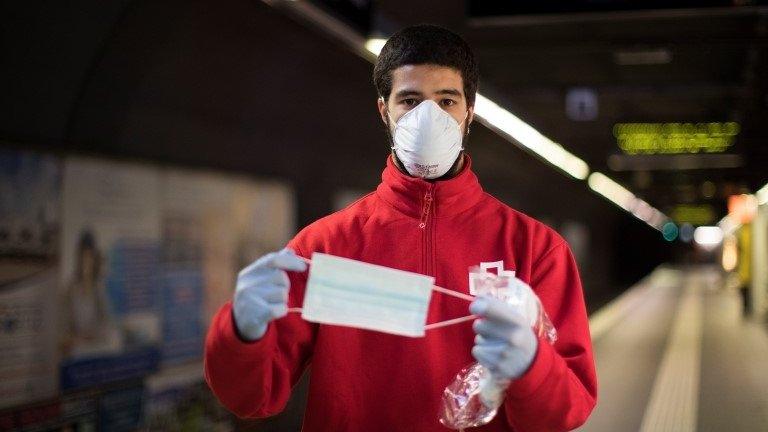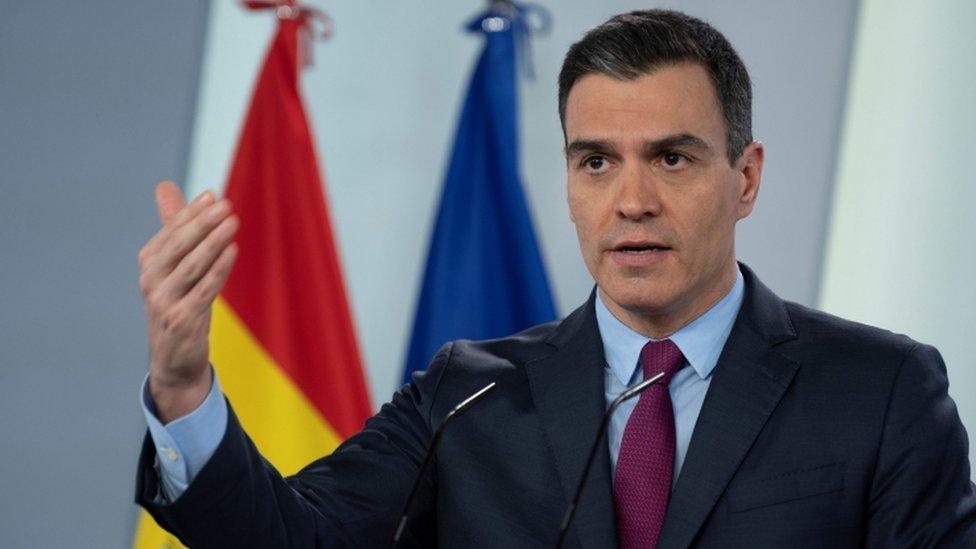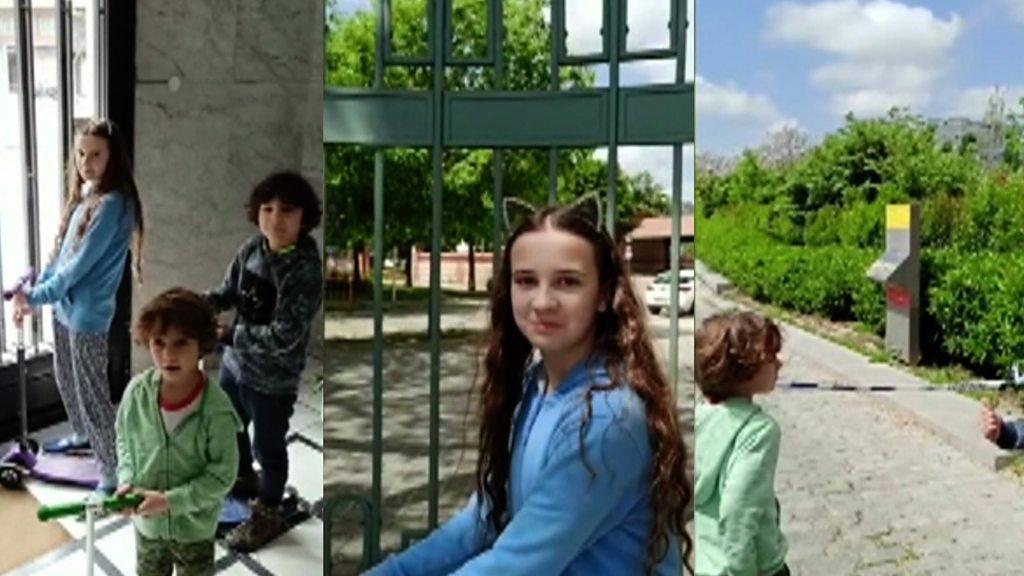Coronavirus: Spain makes masks compulsory on public transport
- Published
The lockdown has eased in Spain, but there are still time restrictions on when people can be outdoors
Masks will be compulsory on public transport in Spain from Monday as the country moves to gradually relax its tough lockdown.
Prime Minister Pedro Sanchez said the government would distribute 6m masks, mainly at transport locations, and give another 7m to local authorities.
Adults in Spain were able to exercise outdoors on Saturday for the first time in seven weeks.
The lockdown was eased for children under 14 a week ago.
Lockdowns in other European countries are also being eased, though social distancing remains in force. Some countries require mask-wearing in shops and on public transport.
Italy has Europe's highest death toll from coronavirus, closely followed by the UK and then Spain (though experts caution that countries do not record death figures in exactly the same way).
The UK's figures show hundreds of people are still falling victim to Covid-19 every day - on Saturday the deaths of a further 621 people were announced.
Both France and Italy recorded fewer than 200 deaths in a 24-hour period.
Italy announced another 474 deaths on Saturday, a larger number than in recent days, but according to La Repubblica that figure includes 282 deaths outside hospitals in April which were not included in earlier figures.

A SIMPLE GUIDE: How do I protect myself?
AVOIDING CONTACT: The rules on self-isolation and exercise
HOPE AND LOSS: Your coronavirus stories
VACCINE: How close are we to finding one?
TESTING: Can I get tested for coronavirus?

Mr Sanchez said Spain was now reaping the rewards of the sacrifices made during the lockdown, one of Europe's strictest.
He also said his government would approve a €16bn ($17.6bn; £14bn) fund to help regional authorities deal with the economic damage inflicted by the coronavirus pandemic.
In Madrid, residents voiced relief to be finally exercising outdoors. "Happy, we feel free!" Susana Piego told Reuters.
Jesus Gutierrez said "it's basic, for physical and mental health, it is basic to allow people to do sport".
Since 14 March people have only been allowed to leave the house to buy food or medicine, to go to work if working from home was not possible, or to briefly walk the dog.
There are now exercise slots for different age groups, and the amount of outdoor exercise time remains limited. Most adults can walk or play sports between 06:00 and 10:00, and between 20:00 and 23:00.

A normal Saturday? Not yet
Guy Hedgecoe, BBC News, Madrid
Spaniards have made the most of the latest easing of the national lockdown, as they have taken to the streets in droves since early this morning.
In many areas, the large numbers who took to the streets made it look almost like a normal Saturday morning, yet social distancing was observed and few cars were on the roads.
Some, however, remain reluctant to venture out.
"I want to go out because it's a beautiful day," said Carmen Pérez, a 65-year-old in Madrid. "But I'm a bit scared of getting infected."
Anna Lindsay, BBC News, Barcelona
While we all understand why we have been in 'la cuarentena' ['quarantine'], I can say from first-hand experience that seven weeks inside our homes, except for essential journeys, has been a test.
For most city residents, buying food or visiting a pharmacy involves walking no further than a few dozen metres.
Today is different. People are in sports gear and running, walking and cycling freely.
A man is playing Freddie Mercury and Montserrat Caballe's famous song Barcelona loudly down at the water's edge and a nearby advertising board says, "Bienvenidos a la libertad" - "Welcome to freedom".

Until last week Spain was the only country in Europe where children under 14 could not leave home at all.
From 12:00 to 19:00 only children aged 14 and under are allowed to go outside, accompanied by an adult. The remaining slots are set aside for elderly and vulnerable people.

The Spanish government will also give masks to the Red Cross and other organisations to distribute
Teenagers aged 14 and above can go out for exercise once in one of the adult slots.
In other news from Europe:
From Monday passengers travelling on Eurostar from the UK will have to wear a face mask or face covering, in line with guidelines from the French and Belgian governments
France has announced plans to extend national emergency measures in place until 24 July. The measures give the government power to impose restrictions to fight coronavirus, although an easing is still planned for later this month.
In Austria small shops reopened two weeks ago, but now all stores are permitted to start up business again. Hairdressers and beauty salons are also allowed to operate
Hungary is allowing business travel from some countries
In Germany, churches, museums and playgrounds will open on Monday.
Meanwhile, the Irish Taoiseach (prime minister) Leo Varadkar has outlined a plan to reopen his country's economy.
Children in Spain can play outside again
On 18 May it is planned that outdoor workers, including builders, will return to their jobs. DIY and hardware stores will reopen.
From that date, Mr Varadkar said, it would be possible to meet friends and family in small groups outdoors, and some sporting activity would be allowed, again in small groups.
- Published28 April 2020

- Published27 April 2020
